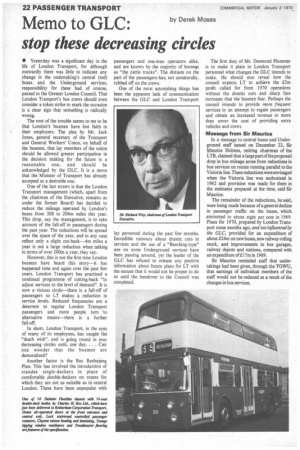Memo to GLC: by Derek Moses
Page 24

If you've noticed an error in this article please click here to report it so we can fix it.
stop these decreasing circles
• Yesterday was a significant day in the life of London Transport, for although outwardly there was little to indicate any change in the undertaking's central (red) buses and the Underground services, responsibility for these had of course, passed to the Greater London Council. That London Transport's bus crews should even consider a token strike to mark the occasion is a clear sign that something is radically wrong.
The root of the trouble seems to me to be that London's busmen have lost faith in their employers. The plea by Mr. Jack Jones, general secretary of the Transport and General Workers' Union, on behalf of the busmen, that lay members of the union should be allowed greater participation in the decision making for the future is a reasonable one, and should be acknowledged by the GLC. It is a move that the Minister of Transport has already accepted as a desirable one.
One of the last straws is that the London Transport management (which, apart from the chairman of the Executive, remains as under the former Board) has decided to reduce the mileage operated by London's buses from 208 to 204m miles this year. This drop, say the management, is to take account of the fall-off in passengers during the past year. The reductions will be spread over the space of the year, and in any case reflect only a slight cut-back-4m miles a year is not a large reduction when talking in terms of over 200m a year, they say.
However, this is not the first time London busmen have heard this story—it has happened time and again over the past few years. London Transport has practised a continual programme of cutting-back "to adjust services to the level of demand". It is now a vicious circle—there is a fall-off of passengers so LT makes a reduction in service levels. Reduced frequencies are a deterrent to regular London Transport passengers and more people turn to alternative means—there is a further fall-off.
In short, London Transport, in the eyes of many of its employees, has caught the "death wish", and is going round in ever decreasing circles until, one day. . . . Can one wonder that the busmen are demoralized?
Another factor is the Bus Reshaping Plan. This has involved the introduction of standee single-deckers in place of comfortable odouble-deckers on routes for which they are not as suitable as in central London. These have been unpopular with
passengers and one-man operators alike, and are known by the majority of busmein as "the cattle trucks". The distaste on the part of the passengers -has, not unnaturally, rubbed off on the crews.
One of the most astonishing things has been the apparent lack of communication between the GLC and London Transport lay personnel during the past few months. Incredible rumours about drastic cuts in services and the use of a "Beeching-type" axe on some Underground services have been passing around, yet the leader of the GLC has refused to release any positive information about future plans for LT with the excuse that it would not be proper to do so until the handover to the Council was completed.
The first duty of Mr. Desmond Plummer is to make it plain to London Transport personnel what changes the GLC intends to make. He should also reveal how the council expects LT to achieve the £2m profit called for from 1970 operations without the drastic cuts and sharp fare increases that the busmen fear. Perhaps the council intends to provide more frequent services in an attempt to regain passengers and obtain an increased revenue to more than cover the cost of providing extra vehicles and crews.
Message from Sir Maurice In a message to central buses and Underground staff issued on December 23, Sir Maurice Holmes, retiring chairman of the LTB, claimed that a large part ofthe proposed drop in bus mileage arose from reductions in bus services on routes running parallel to the Victoria line. These reductions were envisaged when the Victoria line was authorized in 1962 and provision was made for them in the estimates prepared at the time, said Sir Maurice.
The remainder of the reductions, he said, were being made because of ageneral decline in passenger traffic on the buses, which amounted to about eight per cent in 1969. Plans ror 1970, prepared by London Transport some months ago, and not influenced by the GLC, provided for an expenditure of about £,24m on new buses, new railway rolling stock, and improvements to bus garages, railway depots and stations, compared with an expenditure of El7 m in 1969.
Sir Maurice reminded staff that undertakings had been given, through the TGWU, that earnings of individual members of the staff would not be reduced as a result of the changes in bus services.




















































































